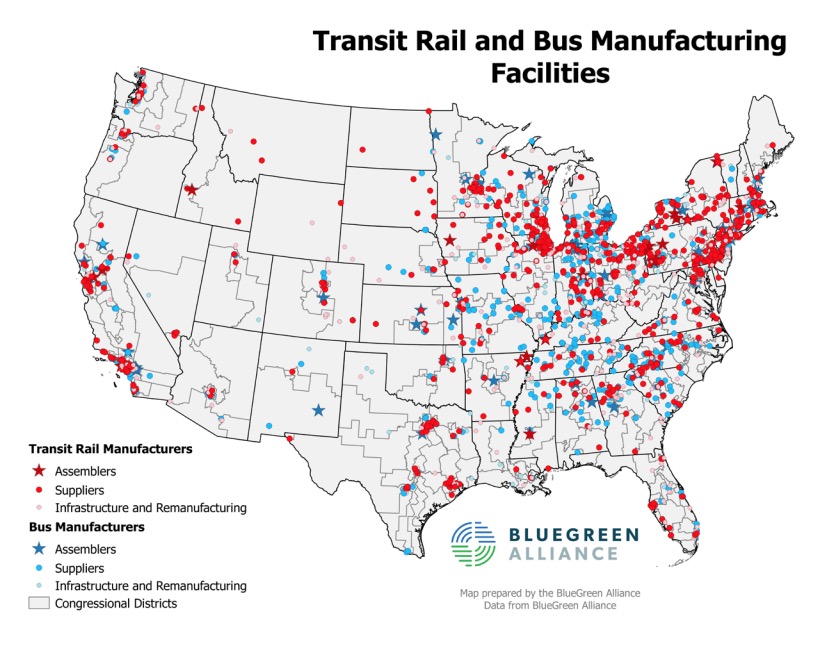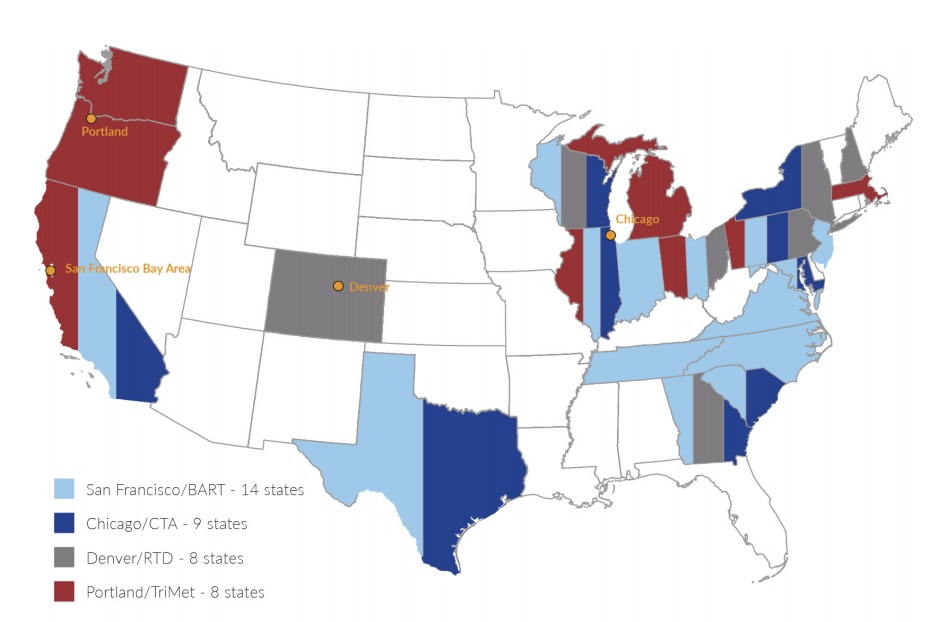TRANSPORTATION FOR AMERICA
Public dollars devoted to making capital improvements to public transportation systems support thousands of manufacturing jobs, in communities small and large, in nearly every state across the country.
 The supply chain for public transportation is as deep as it is wide, touching every corner of the country and employing thousands of Americans who produce everything from tracks, to seats, windows, communications equipment, wheels and everything else in between. As just a snapshot, recent capital improvements made in just four transit systems — San Francisco, Denver, Chicago, and Portland — supported jobs in 21 states.
The supply chain for public transportation is as deep as it is wide, touching every corner of the country and employing thousands of Americans who produce everything from tracks, to seats, windows, communications equipment, wheels and everything else in between. As just a snapshot, recent capital improvements made in just four transit systems — San Francisco, Denver, Chicago, and Portland — supported jobs in 21 states.
Heavy cuts to federal transit spending, as proposed by Congress, would have a devastating effect on these local businesses and the tens of thousands of jobs they support. Without continued federal support, transit projects underway could stall, new or planned projects would be postponed or canceled, and transit agencies would scale back or cancel orders of new railcars or buses. The factories and suppliers that produce or manufacture components for transit systems would have to downsize or shutter without a steady pipeline of projects.
To preserve these jobs and support main streets from coast to coast, Congress and the administration should support and fund the Transit Capital investment Grants (CIG) Program at or above FAST Act levels of $2.3 billion.
Transit construction supports jobs nationwide
More than two thousand manufacturing facilities and companies, spread across 49 states, are tied directly to the manufacture or supply of new transit systems and repairs and upgrades to existing systems. This supply chain employs tens of thousands of workers assembling transit vehicles, manufacturing components and electronics, and building infrastructure.
Investment in transit creates tens of thousands of jobs
According to research by the American Public Transportation Association, every billion dollars invested in transit capital (construction, rehabs, and upgrades) supports more than 15,000 jobs, including good-paying manufacturing jobs.
Recent transit capital projects have supported jobs in numerous states all across the country
 While the majority of all transit rides may take place in major metropolitan areas, the benefits of transit investments ripple far beyond, to communities large and small, from coast to coast. Recent capital upgrades on just four transit systems — the San Francisco Bay Area’s BART, Denver’s RTD, Chicago’s CTA, and Portland’s TriMet — have supported or are supporting jobs in 21 states.
While the majority of all transit rides may take place in major metropolitan areas, the benefits of transit investments ripple far beyond, to communities large and small, from coast to coast. Recent capital upgrades on just four transit systems — the San Francisco Bay Area’s BART, Denver’s RTD, Chicago’s CTA, and Portland’s TriMet — have supported or are supporting jobs in 21 states.
Transit construction depends on hundreds of components and suppliers
Each investment in transit capital construction (or repairs and upgrades to existing transit systems) spurs business at dozens of individual companies and factories, potentially thousands of miles away. Here are just some of the many components that go into a new bus, rail car, or transit line:
For example, rail cars built for new commuter rail service in the Denver region include dozens of components. (See graphic at right). And new rail cars being built to upgrade the Bay Area’s subway fleet include parts from more than thirty suppliers located in thirteen states.
Capital Investment Grant program creates manufacturing jobs
Through the transit Capital Investment Grant program the federal government matches state and local funds to invest in new transit systems or make major upgrades to expand system capacity. This is the primary way that the federal government supports local communities that want to improve or expand their transit networks.
Federal transit capital funds are generally matched at least one-to-one with non-federal funds, making this program particularly effective at leveraging additional funding. When big cities like San Francisco or Chicago invest their own dollars into transit projects alongside federal dollars, they support jobs in the transit supply chain throughout the country.
The pipeline of transit projects in various stages of development awaiting federal grants for construction includes approximately 50 projects in 19 states. This pipeline means reliable business for the transit supply chain and allows companies to open specialized manufacturing facilities, keep workers employed, and have some measure of confidence that their business has the potential for more work in the future.
Buy America provision keeps jobs at home
Buy America provisions for federal transit funds mandate that more than 60 percent of components and subcomponents are manufactured in the United States. These investments directly support American manufacturing jobs. A steady pipeline of federally funded projects encourages foreign manufacturers to set up new manufacturing sites in the U.S. and hire American workers.
Cuts to federal transit funding would destroy jobs
Cuts to the federal programs would have a devastating effect on these suppliers and the tens of thousands of jobs they support. Without continued federal support, projects underway would stall and communities would have to delay plans to invest their own funds in transit. Many of these communities awaiting federal grants have already raised their own money via tax increases or ballot measures and are ready to place orders that would be filled by factories and suppliers tailored to serve this industry — employers that may have to downsize or shutter without a steady, predictable pipeline of transit projects.
Download full version (PDF): Transit Manufacturing Supports Jobs from Coast to Coast
About Transportation for America
t4america.org
Transportation for America is an alliance of elected, business and civic leaders from communities across the country, united to ensure that states and the federal government step up to invest in smart, homegrown, locally-driven transportation solutions. These are the investments that hold the key to our future economic prosperity.






 RSS Feed
RSS Feed